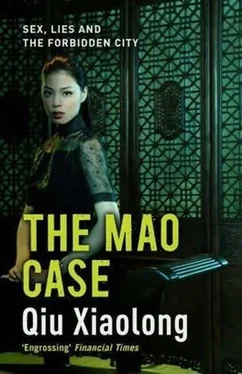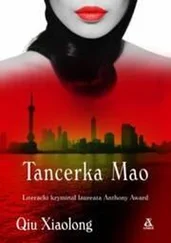Chen set down the file and finished the bitter ginseng tea. It was a Cultural Revolution tragedy that involved two generations. What had happened during those years now appeared absurd, cruel, and was almost unbelievable. Understandably, the Beijing government wanted people to look ahead and not back.
Finally, Chen spread out the investigation report on Jiao, focusing on what was suspicious about her. Jiao was born after Tan’s death. Qian’s fatal accident had happened while Jiao was still an infant. The girl grew up in an orphanage. Like “a tramped and trodden weed” from a sentimental popular song, Jiao failed to get into a high school. Nor could she find a decent job. Unlike other girls her age, she had no friends or fun but instead was prey to the tragic memories of her family, even though others had mostly forgotten that part of the history. After two or three years struggling along, with one odd job after another, she began working as a receptionist at a private company. Then, with the publication of Cloud and Rain in Shanghai, Jiao suddenly quit her job, bought a luxurious apartment, and started a totally different life.
She was suspected of getting a lot of money from the book, but the publisher denied having paid any to her. Then people supposed there was a man behind her metamorphosis. Usually, a Big Buck “keeper” would show off his kept girl like a piece of valuable property, and his identity would come out in time. However, with Jiao, Internal Security had drawn a blank. In spite of their vigilant surveillance, they didn’t see a single man entering her apartment or walking in her company. In yet another scenario, she had inherited a lot of money. But Shang left nothing to the family – all her valuable property had been swept away by the Red Guards in the early days of the Cultural Revolution. Internal Security checked out Jiao’s bank account and found she had very little. She had bought the apartment outright – “a briefcase full of cash” – without having to apply for a mortgage.
For a young girl, she seemed to be wrapped in mysteries, but according to Internal Security, she wasn’t the only suspicious one.
Xie, to whose mansion Jiao had become a regular visitor of late, was another one. Xie’s grandfather had owned a large company in the thirties and had built a huge house for the family – Xie Mansion, which was then considered one of the most magnificent buildings in Shanghai. Xie’s father took over the business in the forties, only to become a “black capitalist” in the fifties. Xie grew up listening to stories about the old glories, holding parties and salons while keeping the doors and windows firmly shut. Sheltered by the resplendent mansion and the family’s remaining fortune, he dallied in painting instead of working a regular job. It was nothing short of a miracle that he managed to keep the house intact through the Cultural Revolution. In the mid-eighties, he began to throw parties at his home again. But most of the partygoers were more or less like him – no longer young, and impoverished in every way except in their memories of their once illustrious family. For them, the parties were their dreams coming true, albeit for only one night. Soon, a collective fashionable nostalgia took hold of the city itself, and the parties became well known. Some took great pride in going to Xie Mansion, as if it was symbolic of their social status. Taiwanese and foreigners began to join in. One Western newspaper wrote that the parties were “the last landscape of the disappearing old city.”
The last landscape or not, the situation for the person hosting the parties was not idyllic after all. Without a regular job, Xie had a hard time maintaining the house and paying for the parties. His wife had divorced him and emigrated to the United States several years ago, leaving Xie alone in the empty house. He consoled himself by collecting the odds and ends left over from the thirties, like an Underwood typewriter, silver-plated dinnerware, a pair of trumpet-shaped speakers, several antique phones, a brass foot warmer, and the like. After all, these were the things his grandparents and parents had told him about, things pictured in the time-yellowed family albums in which he now buried his solitude. And his collection contributed to the legend of the mansion.
In recent years, Xie had started to teach painting at home. He was said to have an unwritten rule for his students: he would only accept young, pretty, talented girls. According to some people who had known him for years, the sixty-plus-year-old Xie might be fashioning himself after Jia Baoyu in the Dream of the Red Chamber.
Jiao went to Xie’s painting classes despite the fact that Xie had hardly received any formal training as a painter, and she went to the parties despite the fact that most of the partygoers were old or old-fashioned or both.
To explain all this, Internal Security had come up with a scenario. Xie must have functioned as a middleman, introducing Jiao to the people interested in the Mao materials in her possession. Foreign publishers would be willing to pay a huge advance for a book about Mao’s private life, just as they had for the memoir by Mao’s doctor. The parties would have provided opportunities for her to meet with those potential buyers.
The course of action proposed by Internal Security was to raid the house on grounds such as obscene or indecent behaviors, or whatever excuse would get Xie into trouble. In their opinion, he would not be a hard nut to crack. Once he spilled, they could take care of Jiao.
But the Beijing authorities didn’t like the proposed “tough measure,” nor were they convinced that such a measure would work. Which was why they had called Chen in.
In the file, Chen didn’t find a copy of the book written by Mao’s personal doctor. It was banned. Nor was there a copy of the bestseller Cloud and Rain in Shanghai.
He was intrigued by the title of that book. “Cloud and rain” was a stock simile for sexual love in classic Chinese literature, evocative of the lovers’ being carried away in a floating soft cloud and of the coming warm rain. It had originated in an ode describing the King of Chu’s rendezvous with the Goddess of Wu Mountain, who declared that she would come to him again in cloud and rain. But “cloud and rain” was also part of a Chinese proverb: With a turning of the hand, the cloud, and with another turning of the hand, the rain, which referred to the continuous, unpredictable changes in politics.
Could the title have a double meaning?
He looked at the clock on the nightstand. Ten fifteen. He decided to go out to buy a copy of Cloud and Rain in Shanghai at a neighborhood bookstore, which stayed open late, sometimes until midnight.
IT WAS A PRIVATELY run bookstore, no more than five minutes’ walk from his home. From across the street, enveloped in the dark, Chen could see that the light was still on.
The bookstore owner, Big-Beard Fei, had started his business in the hopes of making money selling serious books while writing his own postmodernist novel. When his hopes were eventually smashed like eggs against a concrete wall, he turned into a practical bookseller, running a store full of sensational bestsellers and not-so-sensational junk. On one miniature shelf, however, customers might still be able to find some good books – his way of being nostalgic. And he kept the store open late, he declared, because of the insomnia caused by the postmodernist novel he had never finished.
For Chen, the store’s late hours were a blessing. Besides, there was a nice dumpling restaurant just around the corner. Sometimes, after buying a couple of books, he would walk to the restaurant and read over a portion of dumplings, steamed or fried, and a cup of beer. The waitress wore a bodice like a dudou, moving briskly in high-heeled wooden slippers, as if emerging out of Wei Zhang’s lines: “Shining brighter than the moon, / she serves by the wine urn, / her wrists dazzlingly white, / like frost, like snow.” She was nice to him, and to her other customers as well.
Читать дальше












